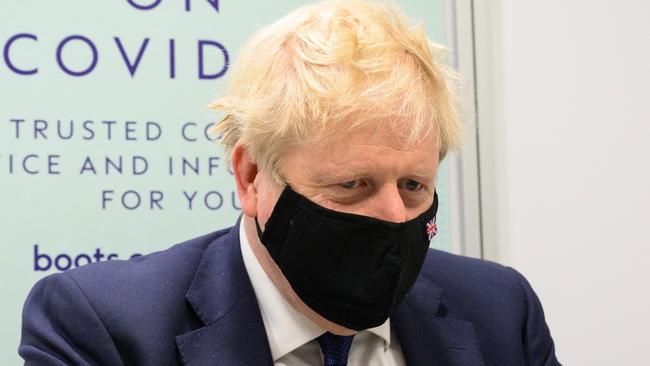No. 10’s arrogance and stupidity are baffling

After Richard Nixon’s men went down for obstructing justice and perjury there emerged the idea that if only they hadn’t covered up the whole thing it would all have been fine. Yet this ignores the burglaries.
The Watergate break-in was only one in a series of covert operations. Coming clean when the burglars were caught would have involved admitting White House involvement not just in Watergate but, at a very senior level, in earlier crimes. It was too late to, as the phrase went at the time, “let it all hang out”. Hence the cover-up.
What brought down the Nixon White House was the conspiracy to use illegal methods to undermine opponents. The cover-up was just an attempt to avoid being held accountable.
When the news that No 10 had been holding parties during the Covid lockdown first became public, their response was to deny it. There is a temptation to regard this – the cover-up – as the “real” error. To think that if only they had found a better “comms” response than denying it they would be in far less trouble now. But this isn’t true.
When news about the first party broke, they all appreciated that this wasn’t a single event, one that could be admitted and disavowed, a slip up by junior officials. There had been a pattern of holding social events and the prime minister had been involved. There was no good, politically viable explanation.

The only effective political response to having a bunch of parties in Downing Street during lockdown is to unhave the parties. Stephen Hawking once held a party for time travellers but only sent out the invitations after the party had taken place. No one came. This constitutes experimental evidence that you can’t go back in time, that you can’t unhave a party you’ve already held.
So the “comms” team were only left with two options. The first was to fail to tell the truth – to claim there hadn’t been any parties, even though there had been. This was a “cover-up” and bound to fall apart, with everyone making free with the Watergate cliche. The second was to admit the truth – that there had been several parties, including one organised by the prime minister’s private office which he had attended. And this admission, though morally essential, was understandably even more politically unattractive.
The parties offend against our basic idea of fairness, the one that is hardwired into us, the one that has evolved. Here is the way a number of evolutionary psychologists think of it. They ask this: why do we co-operate with people who do not share our genes? One explanation is that we do favours for people because we believe they will, in some form, return the favour. So vampire bats regurgitate blood into the mouths of other vampire bats who are on the verge of death, believing that in future the giver will be the taker.
But there is a problem with reciprocation. It is in your interest to take and avoid giving, as long as you can get away with it. We develop all sorts of techniques to disguise our deception.

Robert Trivers, one of the pioneers in the field, suggests that self-deception is explained by this. If people can fool themselves, it is easier for them to fool other people without displaying telltale signs that they are lying.
At the same time, it is vital to everyone else that the deceiver isn’t allowed to get away with it. So we have developed strong suspicion and a strong social norm to protect ourselves against people who take out without putting in.
We see this deception, and call it out, all the time. There are perceived breaches of the fairness norm – ones in which I feel as if I have put in, but you have taken out – in almost every really impactful political controversy.
Take welfare policy, for instance. There is a constant feeling, whether justified or not, that fraudsters are on the take, receiving money they aren’t entitled to. Or immigration, where people are suspicious, often wrongly, that others may be using the benefits system without having contributed to it. Or bankers’ bonuses, usually ignored, but understandably a cause of fury when taxpayers were putting money into the banking system.
The parties are a classic breach of the fairness norm and that is why they are not just a Westminster issue. That is why they are so politically potent. The Covid regulations involved many people making sacrifices on the understanding that their sacrifice was being reciprocated. They would stay at home and eschew social events to avoid spreading the disease, and they expected everyone else to do the same.
And people’s fury over someone not making sacrifices will be proportional to the size of their own sacrifice. In other words, very large.

When someone says that on May 20, 2020, they were unable to see a sick relative while Downing Street was holding parties, it is hopeless to quibble about how much cheese was involved or how hard the people were working or whether, the party having been in the garden, it was really all that infectious.
These arguments ignore the fairness norm and they will not work. No explanation involving telling the truth will work.
No wonder the approach has been to deny that rules were broken and to pretend that the prime minister was furious to discover that perhaps they had been. The only tiny problem with this being that rules were indeed broken and the prime minister at least knew they were being broken and probably broke them himself. Which was always going to emerge. No explanation involving not telling the truth will work either.
And all that is without considering the baffling stupidity and arrogance of the whole thing. Quite often when I see someone get themselves into political hot water I am sympathetic. I can imagine how it all happened, the slip of the tongue, the thoughtless act, the hasty tweet. I can imagine doing it myself. But this is different.
Two weeks after the resignation of Professor Neil Ferguson as a government adviser for lockdown breaches and it is “please bring a bottle"? Did nobody stop to consider that, whether or not it was wrong, this might not be wise?
There are those who have said well, what did you expect? And isn’t it all priced in? But we’re talking about 10 Downing Street and the country’s prime minister so it is not priced in by me, and it never will be.
And what did I expect? There can only ever be one answer to that. Whatever I expect, I demand better.
The Times







Let’s get the Watergate cliche out of the way first. It isn’t “always the cover-up” that gets you into trouble. It’s the crime. Failing to tell the truth about Downing Street parties may have been unacceptable. But the real problem was the parties.